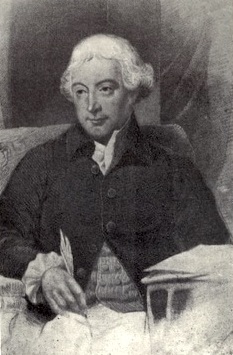
Sir John Strathearn Hendrie was the 11th Lieutenant Governor of Ontario from 1914 to 1919.

Admiral Sir Charles Hamilton, 2nd Baronet KCB, was a British naval officer and commodore-governor of Newfoundland.

Admiral John Montagu (1719–1795) was an English naval officer and colonial governor of Newfoundland.
John Arrowsmith was an English theologian and academic.

John Graham Haggart, was a Canadian politician.

Hasketon is a village and civil parish in the East Suffolk District of Suffolk, England.

Sir Christopher Yelverton was an English judge and Speaker of the House of Commons.

John Bacon was a member of the United States House of Representatives from Massachusetts.

John Lloyd, born at Pendine, Carmarthenshire, Wales, the son of Morgan Lloyd, was principal of Jesus College, Oxford, vice-chancellor of the University of Oxford and Bishop of St David's.
John W. Wood (1884–1959) was an English association football player, referee and coach who was briefly head coach of the United States men's national soccer team. He was born in Nottingham, England. Upon emigrating to the US, Wood played for several teams on the east coast. He later became the soccer coach at Oak Park High School in Oak Park, Illinois.
Events from the year 1616 in Ireland.

Little Wenham is a small village in Suffolk, England. It is part of the civil parish of Wenham Parva – the ancient name for Little Wenham) within Babergh district. Its population is included there.
John Tyrrell was a British musicologist. He published several books on Leoš Janáček, including an authoritative and largely definitive two-volume biography. Tyrrell was born in Salisbury, Zimbabwe and worked as a professor of music and executive editor of The New Grove Dictionary of Music and Musicians. He died on October 4, 2018, aged 76.
John Butler was an Irish politician, farmer and trade union official. He was first elected to Dáil Éireann at the 1922 general election for the Waterford–Tipperary East constituency as a Labour Party Teachta Dála (TD). He was re-elected for the Waterford constituency at the 1923 general election. He lost his seat at the June 1927 general election. He stood for the Dáil again at several subsequent general elections but was not elected.
Richard T. Drinnon was professor emeritus of history at Bucknell University. He also taught at the University of California, Berkeley, where he taught courses on American history. He was denied tenure due to his political activism and was about to be called up by the House Un-American Activities Committee. Drinnon participated in the Columbia University protests of 1968, and he published several books, including "Rebel in Paradise: A Biography of Emma Goldman" and "Facing West: The Metaphysics of Indian-Hating and Empire-Building."

All Saints Church is a redundant Anglican church in the village of Little Wenham, Suffolk, England. It is recorded in the National Heritage List for England as a designated Grade I listed building, and is under the care of the Churches Conservation Trust. It stands in an isolated position close to Little Wenham Hall, about 0.6 miles (1 km) to the northwest of Capel St. Mary.

The Battle at Chignecto happened during Father Le Loutre's War when Charles Lawrence, in command of the 45th Regiment of Foot and the 47th Regiment, John Gorham in command of the Rangers and Captain John Rous in command of the navy, fought against the French monarchists at Chignecto. This battle was the first attempt by the British to occupy the head of the Bay of Fundy since the disastrous Battle of Grand Pré three years earlier. They fought against a militia made up of Mi'kmaq and Acadians led by Jean-Louis Le Loutre and Joseph Broussard (Beausoliel). The battle happened at Isthmus of Chignecto, Nova Scotia on 3 September 1750.
Sir Roger Townshend was an English landowner, knight and politician.
John Joseph Counihan was an Irish politician. He was a member of the Free State Seanad from 1922 to 1936, and of Seanad Éireann from 1938 to 1951. He was first elected to the Seanad in 1922. He did not serve in the 2nd Seanad. From 1938 onwards, he was elected by the Agricultural Panel. He was variously an independent, Cumann na nGaedheal and Fine Gael member of the Seanad.











